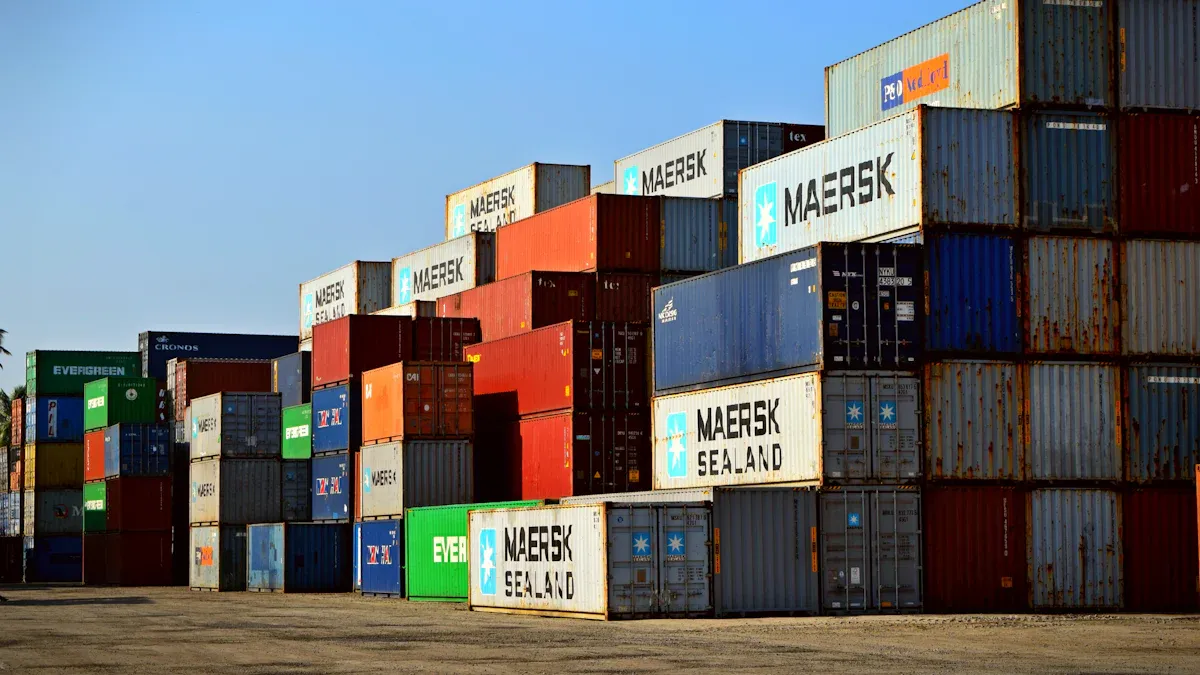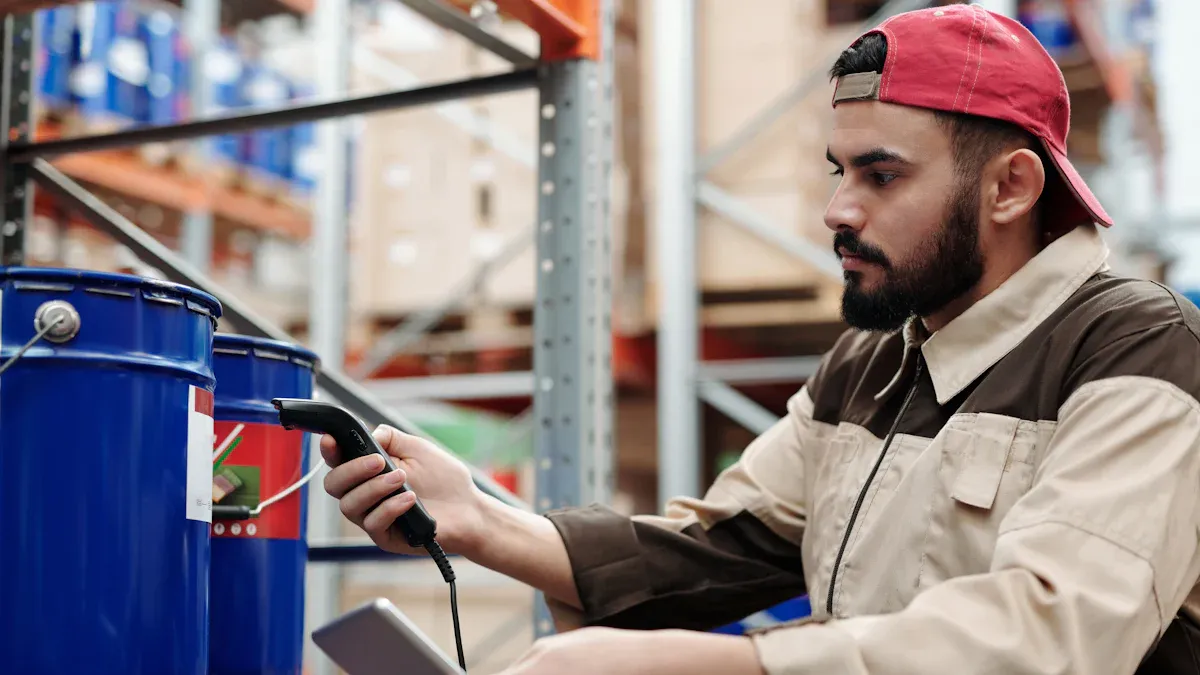Efficient and Reliable: What Makes JUSDA Stand Out in the Logistics Industry

In today's fast-paced logistics industry, efficient and reliable operations are no longer optional—they are essential. Companies like JUSDA stand out by embracing innovation to meet these demands. For example, AI-powered tools optimize routes and predict demand, while automation enhances speed and accuracy. These advancements not only streamline operations but also address challenges like labor shortages and last-mile delivery complexities. JUSDA's ability to adapt to client needs, ensure on-time delivery, and reduce costs makes it a trusted partner for businesses seeking seamless supply chain solutions.
Key Takeaways
JUSDA uses smart tools like AI and IoT to make logistics faster and more reliable.
The JusLink system lets businesses see shipments live and handle stock better.
Using machines instead of people cuts mistakes and speeds up deliveries, making customers happier.
Special plans for different industries help JUSDA solve tricky logistics problems easily.
Green methods, like eco-friendly transport and less waste, make JUSDA a caring and responsible partner.
Technology Integration for Efficiency

JusLink: Revolutionizing Supply Chain Management
JusLink, JUSDA's intelligent supply chain platform, transforms how you manage logistics. By integrating IoT, cloud computing, and big data, JusLink ensures seamless collaboration across the supply chain. This platform provides real-time visibility, enabling you to track shipments, monitor inventory, and coordinate with suppliers effortlessly. For example, JUSDA's collaboration with Company A demonstrated how JusLink improved supply chain efficiency, reducing delays and enhancing transparency. These advancements make your operations more efficient and reliable, helping you meet customer demands with precision.
JusLink also supports multimodal transportation strategies, allowing you to optimize routes and reduce costs. Company B, for instance, achieved faster delivery times and significant cost savings by leveraging this technology. With JusLink, you gain a competitive edge in the logistics industry, ensuring your supply chain remains agile and responsive.
AI-Driven Solutions for Predictive Logistics
Artificial intelligence plays a pivotal role in predictive logistics. AI-powered tools analyze vast amounts of data to forecast demand, optimize inventory, and plan routes dynamically. This technology enhances fleet coordination, reducing idle time and improving fuel efficiency. For instance, AI can improve demand prediction accuracy by 8%, helping you dispatch vehicles more effectively and lower operational costs.
AI also mitigates risks in your supply chain. By identifying potential disruptions, it enables you to take proactive measures, ensuring smooth operations. Predictive analytics further enhances efficiency by adjusting inventory levels based on anticipated customer needs. This approach not only prevents overstock or stockouts but also reduces excess inventory by 10%. With AI-driven solutions, your logistics operations become more efficient and reliable, setting you apart in a competitive market.
Automation Enhancing Operational Efficiency
Automation revolutionizes logistics by streamlining operations and reducing manual errors. Automated inventory management systems, for example, achieve accuracy rates of up to 99.99%, minimizing the need for manual checks. Implementing warehouse management systems (WMS) simplifies inventory tracking and order picking, saving time and resources.
Automation also improves delivery times. Technologies like route optimization and real-time tracking can reduce delivery times by an average of 30%. This not only enhances customer satisfaction but also boosts operational transparency. Companies using transportation management systems (TMS) report up to an 8% reduction in freight costs, showcasing the cost-saving potential of automation. By adopting these technologies, you can ensure your logistics operations remain efficient and reliable, meeting the demands of modern supply chains.
Customer-Centric Approach
Tailored Solutions for Industry-Specific Needs
Every industry has unique logistics needs, and JUSDA excels at creating solutions that address these specific challenges. By tailoring services to your industry, JUSDA ensures that your supply chain operates smoothly and meets your business goals.
Retail and E-Commerce: Custom kitting services can improve order processing time by 30% and enhance fulfillment accuracy. This leads to higher customer satisfaction and repeat business.
Healthcare: Tailored kitting for medical kits reduces delivery lead times by 25%. It also ensures compliance with strict regulatory standards, making your operations more reliable.
Manufacturing: Just-in-time (JIT) kitting optimizes inventory and boosts production efficiency. This approach saves 20% on inventory costs and ensures consistent delivery schedules.
Food and Beverage: Customized packaging reduces material waste by 25% while maintaining product integrity. This ensures compliance with safety standards and keeps your products fresh.
These tailored solutions not only improve efficiency but also enhance reliability, helping you build trust with your customers. By addressing the specific needs of your industry, JUSDA positions itself as a partner you can depend on.
Real-Time Support and Proactive Communication
In logistics, real-time support and proactive communication are essential for maintaining customer satisfaction. JUSDA provides you with tools that keep you informed and engaged throughout the supply chain process.
Real-time tracking gives you timely updates on shipment locations and expected delivery times. This transparency reduces the need for you to contact customer service, creating a smoother experience. Proactive notifications keep you informed about order progress, alleviating any concerns and building trust in the process. Companies like Amazon and FedEx have shown how proactive communication can transform waiting into a positive experience.
Responsive customer support also plays a key role. When inquiries arise, quick resolutions prevent frustration and strengthen relationships. Real-time tracking further optimizes delivery routes, reducing delays and improving operational efficiency. Clear updates on shipment status enhance satisfaction and encourage repeat business.
By prioritizing communication and support, JUSDA ensures your logistics operations remain efficient and reliable. This approach fosters loyalty and positions your business for long-term success.
Sustainable Practices in Logistics

Eco-Friendly Transportation and Carbon Tracking
Adopting eco-friendly transportation methods can significantly reduce your logistics operations' environmental impact. By leveraging advanced technologies, you can make your supply chain more sustainable and cost-effective.
Route optimization technology uses telematics and GPS tracking to minimize fuel consumption and emissions. This ensures that vehicles take the most efficient paths, saving time and resources.
Eco-friendly vehicles, such as electric and hybrid models, lower carbon footprints while reducing operational costs. Transitioning to these vehicles demonstrates your commitment to sustainability.
Optimizing vehicle loads maximizes cargo space, reducing the number of trips required. This approach cuts fuel use and emissions, making your operations more efficient.
You can also explore alternative fuels to further enhance sustainability:
Biodiesel burns cleaner than traditional diesel but may strain agricultural resources.
Hydrogen produces only water as a byproduct, though its production currently requires significant energy.
Natural gas burns cleaner than gasoline and diesel, though methane leaks can pose challenges.
Tracking and reducing carbon emissions is equally important. Tools that measure emissions help you set achievable decarbonization goals. AI and IoT technologies optimize delivery routes, reducing delays and fuel consumption. Collaborating with third-party logistics providers enhances visibility, ensuring transparency in your supply chain.
Waste Reduction Through Packaging and Recycling
Sustainable packaging practices can help you minimize waste and lower costs. Reusable packaging, for instance, allows multiple uses, reducing the need for single-use materials. Lightweight packaging lowers fuel consumption during transportation, making your operations more efficient. Recyclable packaging closes the loop on waste by repurposing materials, contributing to a circular economy.
You can also adopt innovative solutions like biodegradable and compostable materials. For example, food delivery businesses use containers made from PLA (polylactic acid) or bagasse, which decompose naturally. These materials reduce single-use plastic waste and align with sustainability goals.
By integrating technology into packaging design, you can further enhance efficiency. Smart packaging solutions track and monitor shipments, ensuring optimal use of resources. These practices not only reduce environmental impact but also improve your brand's reputation as a responsible business.
Data-Driven Decision Making
Predictive Analytics for Supply Chain Optimization
Predictive analytics transforms how you manage your supply chain by enabling smarter, data-driven decisions. This technology uses historical and real-time data to forecast future trends, helping you stay ahead of potential challenges.
It allows you to forecast demand accurately, ensuring you produce the right amount of goods and allocate resources effectively.
It optimizes inventory management by predicting demand patterns, reducing the risk of stockouts or overstocking.
It identifies potential issues before they arise, enabling you to make proactive decisions that enhance operational efficiency.
For example, by analyzing seasonal trends, predictive analytics can help you adjust inventory levels during peak periods. This ensures you meet customer demands without overburdening your storage facilities. Additionally, it improves fleet management by optimizing delivery routes based on traffic patterns and weather conditions. These insights reduce delays and improve fuel efficiency, saving both time and costs.
By adopting predictive analytics, you gain a competitive edge in logistics. It empowers you to make informed decisions, streamline operations, and deliver exceptional service to your customers.
Real-Time Tracking for Transparency and Control
Real-time tracking revolutionizes logistics by providing you with unparalleled visibility and control over your operations. This technology enhances efficiency, ensures security, and improves customer satisfaction.
With real-time tracking, you can offer faster shipping options like same-day or next-day delivery. Customers receive accurate delivery times and can monitor their orders, which builds trust and enhances their experience. Businesses that use this technology also benefit from optimized delivery routes, reducing delays and improving operational efficiency.
For instance, tracking tools allow you to monitor shipments in transit, ensuring they reach their destinations on time. If disruptions occur, you can quickly reroute deliveries to minimize delays. This level of transparency fosters stronger relationships with your customers and partners.
By integrating real-time tracking into your logistics operations, you ensure greater reliability and control. It not only enhances your efficiency but also positions your business as a trusted and dependable partner in the supply chain.
Multimodal Transportation Strategies
Diverse Transport Modes for Global Reach
Using diverse transport modes enhances your logistics operations by offering flexibility and efficiency. Each mode—air, sea, rail, and road—serves unique purposes, allowing you to adapt to varying shipment needs. For instance, air transport ensures fast delivery for urgent shipments, while sea freight handles bulk goods cost-effectively. Rail and road transport bridge the gap for regional and last-mile deliveries.
By leveraging multiple transport options, you can optimize costs and resources. Here are some key benefits:
Flexibility in logistics operations, enabling you to meet specific shipment requirements.
Cost savings by selecting the most efficient transport mode for each shipment.
Efficient resource utilization by matching transport methods to shipment sizes.
This approach ensures your supply chain remains agile and responsive, even in dynamic global markets. For example, combining sea freight for long distances with road transport for final delivery minimizes costs while maintaining reliability. By adopting multimodal strategies, you can expand your global reach and meet customer expectations effectively.
Seamless Coordination Across Transportation Channels
Coordinating multiple transportation modes requires careful planning and execution. Seamless integration ensures your shipments move smoothly across channels without delays or errors. Effective communication plays a vital role in achieving this. Clear communication among stakeholders helps address challenges and align expectations, keeping operations on track.
Standardizing processes also simplifies coordination. A centralized platform for documentation allows all parties to access and submit necessary information efficiently. This reduces errors and ensures consistency across operations. Streamlined workflows further enhance efficiency, ensuring every stakeholder understands their role and responsibilities.
To illustrate, imagine a shipment moving from a factory to a port, then by sea to another country, and finally by road to its destination. With standardized processes and centralized documentation, you can ensure each step transitions seamlessly. This level of coordination not only improves delivery times but also builds trust with your customers. By focusing on integration, you can create a logistics network that is both efficient and reliable.
JUSDA's strengths lie in its innovative technology, customer-focused solutions, sustainable practices, data-driven strategies, and multimodal transport. These qualities make your supply chain operations efficient and reliable, positioning JUSDA as a leader in the logistics industry. Emerging trends like AI and IoT are reshaping logistics. Companies now:
Integrate AI and IoT for real-time tracking and operational optimization.
Invest in advanced technologies to enhance visibility and control.
JUSDA stays ahead by leveraging these technologies and prioritizing sustainability. This readiness ensures your business thrives in an evolving logistics landscape.
FAQ
What industries does JUSDA serve?
JUSDA supports a wide range of industries, including electronics, automotive, FMCG, healthcare, and heavy equipment. Each solution is tailored to meet the unique logistics challenges of your industry, ensuring efficiency and reliability in supply chain operations.
How does JUSDA ensure real-time visibility in logistics?
JUSDA uses advanced technologies like IoT and JusLink, its intelligent supply chain platform. These tools provide real-time tracking, inventory monitoring, and shipment updates. You gain complete visibility and control over your supply chain operations.
What makes JUSDA’s multimodal transportation strategies effective?
JUSDA combines air, sea, rail, and road transport to optimize costs and delivery times. Seamless coordination across these modes ensures your shipments move efficiently, even in complex global markets. This flexibility enhances reliability and expands your reach.
How does JUSDA contribute to sustainability in logistics?
JUSDA adopts eco-friendly practices like route optimization, carbon tracking, and sustainable packaging. These initiatives reduce emissions, minimize waste, and lower operational costs. By choosing JUSDA, you align your business with environmentally responsible logistics solutions.
Can JUSDA handle cross-border logistics challenges?
Yes, JUSDA specializes in managing complex cross-border logistics. Its expertise in customs coordination, real-time tracking, and multimodal transport ensures smooth operations. You can rely on JUSDA to navigate diverse regulations and deliver on time.
See Also
Exploring JUSDA's Unmatched Supply Chain Solutions for Success
Unveiling JUSDA's Growth in Sustainable Logistics Practices
Redefining Efficiency Through JUSDA's Logistics Optimization Strategies
Unlocking Enhanced Efficiency with JUSDA's Logistics Technology
Revealing JUSDA's Innovative Logistics Solutions for Modern Manufacturing
